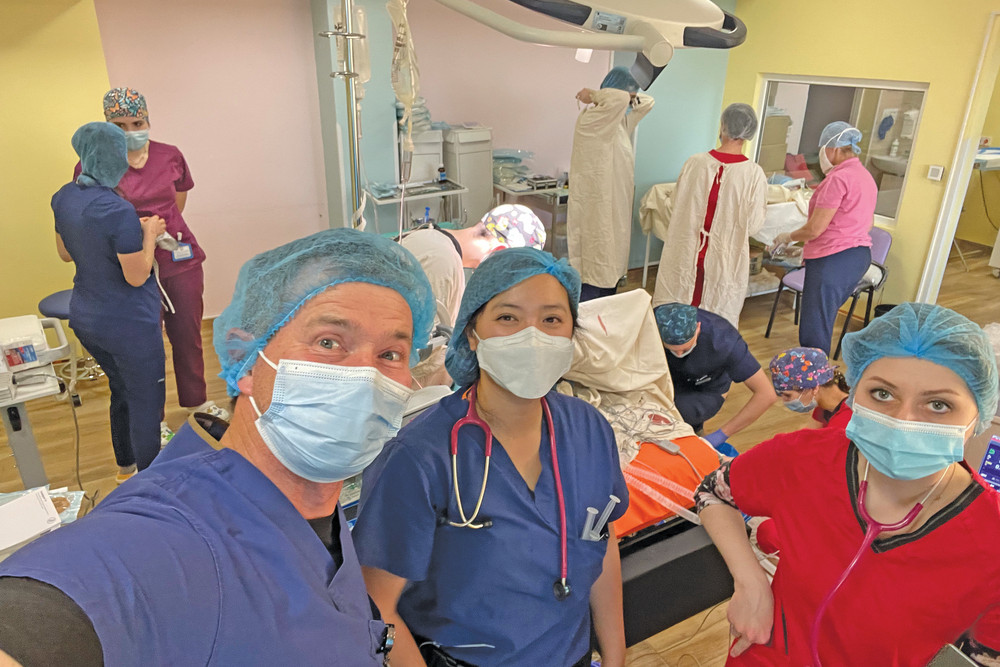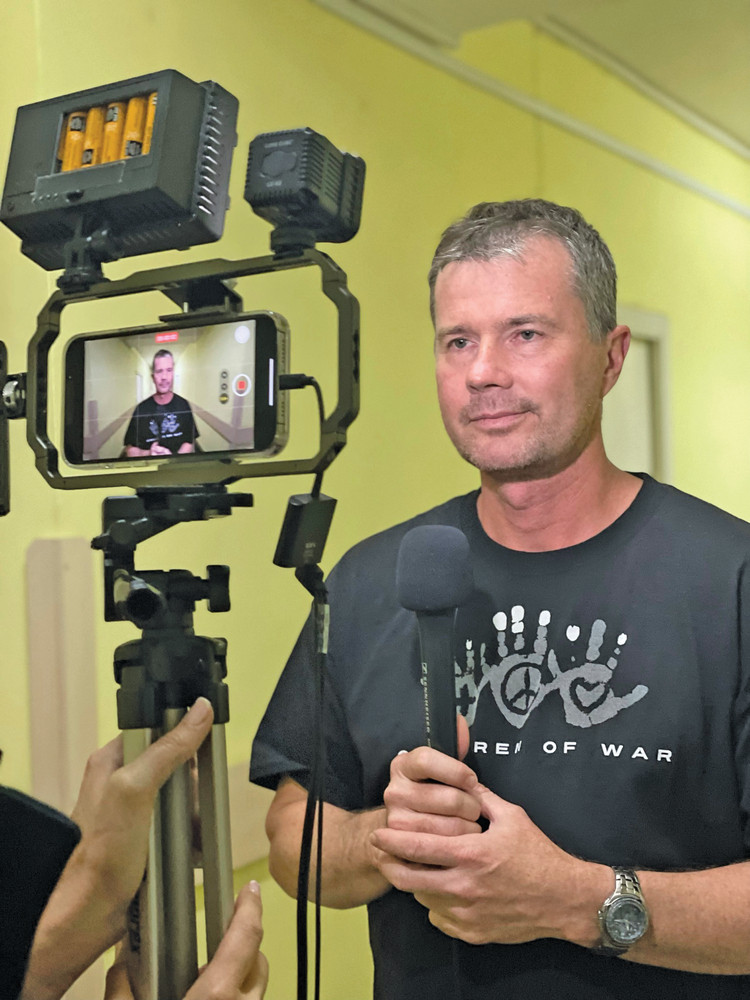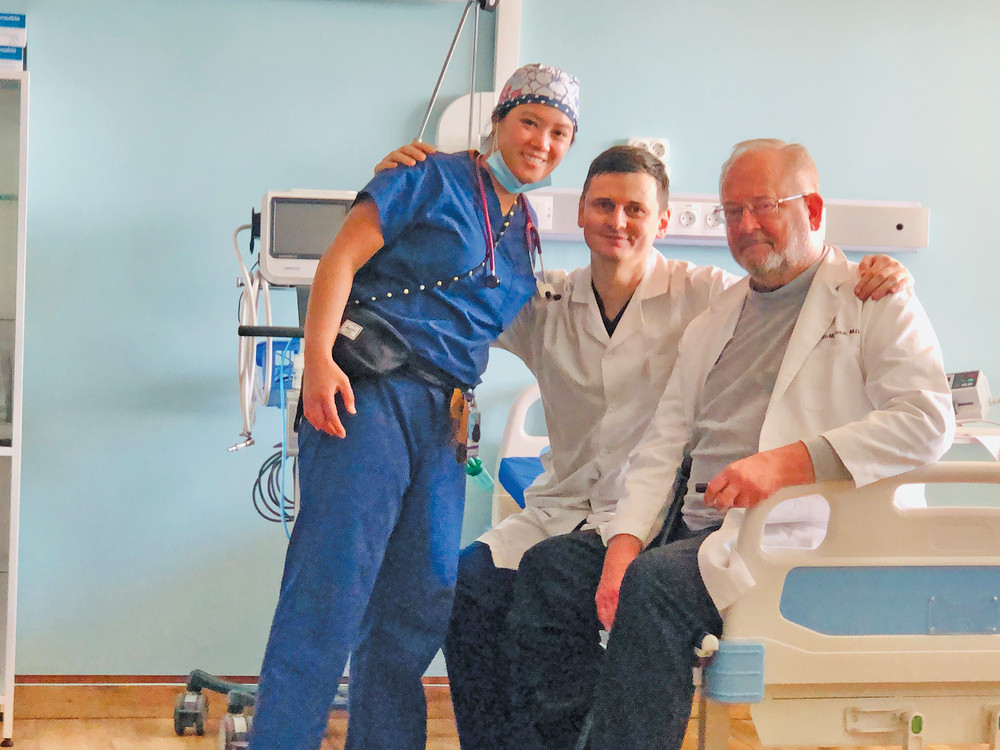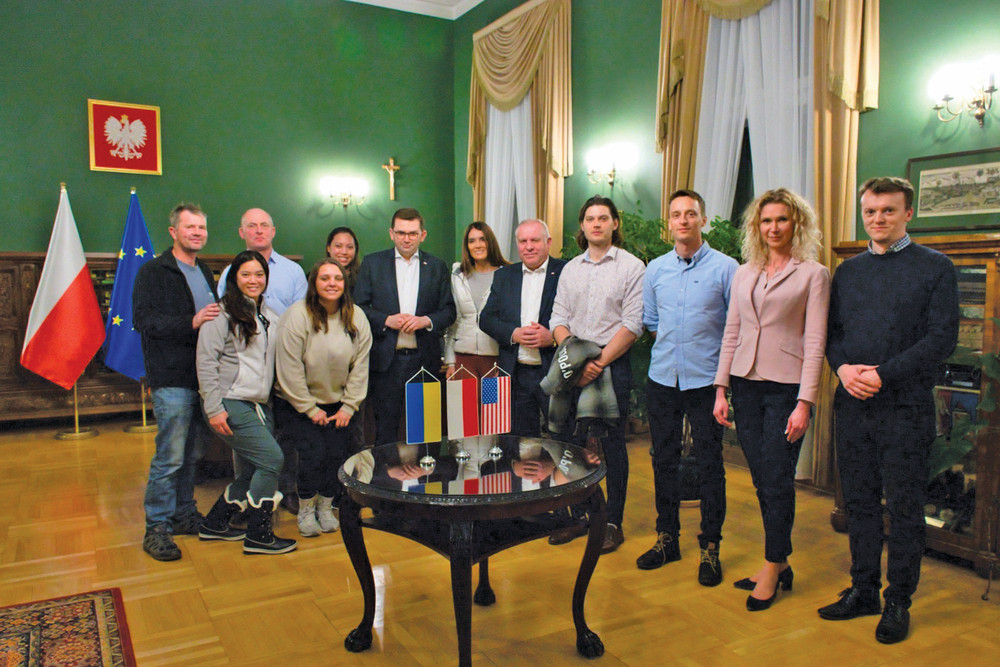General News
29 April, 2022
Atherton man on Ukrainian medical mission
AN Atherton pilot has found himself at the front of the war in Ukraine as part of a medical mission that provided life-saving surgeries to children as young as seven days’ old in the city of Lviv.

David Keough accompanied the medical mission with just two days’ notice, according to Dr Clementine Vo who emailed The Express from Los Angeles to advise of Mr Keough’s involvement so he could receive the “recognition that he deserves back at home”.
“On 12 March, Mr Keough jumped on a plane with me and several other medical practitioners,” Dr Vo wrote.
“Along with several suitcases packed with medical supplies, we ventured and made our way from Los Angeles, California to Munich, Germany, and eventually to Krakow, Poland. From there, we drove via bus to Lviv, Ukraine.”
The city of Lviv is located in the far west of Ukraine and 70km from the Polish border. The city was thought to be a safe haven for thousands of refugees who made their way there from other places in Ukraine until late last month when air raid sirens disrupted the relative peace they had enjoyed since the war with Russia began.
Russian missiles hit an oil depot and a defence facility in residential parts of the city, causing injuries and considerable damage to infrastructure. Just last week, at least seven people died after another bombardment from Russian forces.
Dr Vo said during their stay there, Mr Keough helped her and other medical physicians and nurses provide life-saving surgeries to children as young as seven days old.
“You might wonder what a pilot is doing on a medical mission trip - he acted as a medical assistant, specifically as my anaesthesia assistant, and I found him extremely helpful,” she said.
“He made our jobs a lot easier, and we felt much safer with David around.”
Dr Vo said she was prompted to contact the newspaper when she noticed a copy of The Express on his table and wanted to make sure that he received the recognition he deserved.
“His sister from Cairns came out last week to visit and brought his mail and, with it, The Express,” she said.
The medical mission was sponsored by the Children of War Foundation and the Novick Cardiac Alliance.
Read about Mr Keough's experience through his first-hand recount below
I’ve been living in the USA for the last four years, working as an airline pilot. I grew up in Atherton where my parents still live and have other siblings in Cairns. I met my fiancé Clementine Vo a year and half ago here in LA where we are both based.
When the conflict started in Ukraine, I had been following the media reports in the lead up and my fiancé and I, along with the majority of thinking/feeling individuals, felt outrage, horror, disbelief and sympathy and compassion for the people involved in the unfolding situation.
Clementine was quick to suggest buying a plane ticket and flying straight over there in the very early stages. I didn’t pass off her enthusiasm and suggested that despite just simply feeling like helpless onlookers at the time, that in due time there would be organised outreach for volunteers of various persuasions to address differing needs.
She didn’t have to wait long. Probably around two weeks after the invasion, she informed me of a Facebook message from Dr Bill Novick of Cardiac Alliance, reaching out for medical personnel to travel to eastern Europe for a medical mission trip.
Initially she informed me that they were to be working at a hospital in Poland. I immediately thoughtful of travelling with her but wasn’t specifically worried if my circumstances didn’t allow that, with the team being stationed in Poland.
But the information soon came through that they would be in fact travelling over the border to Ukraine. And more specifically to perform life-saving paediatric heart surgeries for six sick kids at a children’s hospital in Lviv.

Once that information was realised, Clementine didn’t hesitate to put her hand up as that is her area of expertise working at Los Angeles Children’s Hospital.
This changed my thinking to “I definitely have to go!” to make sure she was okay being there for the week and know she was safe, and to support her, and volunteer my time and energy in any way I could.
I asked her if a flight ticket for me could be organised and discussion soon turned to what I could actually do there in Lviv. The Cardiac alliance team was aided and funded in part by the Children of War foundation based in LA.
Within a week or so we were on a plane to Krakow via Munich and onto Lviv in a coach.
It was about 24 hours non-stop travel arriving in Lviv to air raid sirens at 4am.
We passed by checkpoints and anti-tank steel hedgehogs along the main highway from the Polish border to Lviv, also passing by within miles of where the first Russian missiles had landed merely 24 hours earlier – the closest at that stage that far west and close to the Polish border, killing some 30 people.
There was a little apprehension but Dr Novick, a respected cardiac surgeon from Tennessee and founder of Cardiac Alliance, isn’t easily rattled having performed paediatric heart surgeries in various conflict areas and war zones around the globe including the Middle East, Africa and the Balkans.
We had to wait to be greeted by the young Ukrainian resident surgeon, Vitali, until he thought it was safe a little after 4am.

We gathered bleary-eyed the next morning for what was going to be preparation to start a case but another medical team that had fled Kharkiv and Kyiv earlier had relocated there so there was some reorganisation of who was doing which cases.
Clementine had stocked me with my own sets of “scrubs” and so I looked like part of the team and basically helped her organise all the boxes and suitcases of medical equipment we had brought with us.
Setting up to be an anaesthetist in a foreign country with a team you haven’t worked with before with a language you don’t understand has its pressures.
I’d never been in an operating room before so I was new to the surroundings but found it fascinating observing and helping my fiancé set up and go to work.
She did a heart surgery case the next day which I got to watch. Prior to that, she was inspecting various medical equipment which was all written in Ukrainian so I helped her with Google translate camera function to figure which self-tests to run and which buttons and switches did what!
Throughout the case, I would run back down to our accommodation and gather various other bits and pieces she would need and bring them back to the OR. It was fascinating to watch the surgery being performed and Dr Novick mentoring the young Ukrainian surgeon Vitali.
It was a tiring first few days as they launched straight into surgeries and Clementine appreciated me being there also as an emotional support with the added pressure and stress of unfamiliarity.
I would have liked to explore and travel out of the hospital grounds with a reporter from KTLA news who travelled over with us, to see if there were other ways I could make myself useful, but we were told it would be better not to draw any undue attention to ourselves seeing as though there were multiple attacks on hospitals further east in the country.
On the off days from surgery, Clementine would help out in the ICU and on the third day, they had an open heart case which I also got to watch and helped intubate the three-year-old patient.
It was eye opening to be a part of her world and see medical professionals at work and up close, having had my fair share of surgeries.
Throughout our week stay there (we were accommodated at the hospital), the air raid sirens frequently sounded day and night. At the end of the week, the team was wrapping up a case when half of us had to pack within 30 minutes and jump in an ambulance and dash to the Polish border to beat the curfew.

Volunteer ambulance drivers who ferry medical supplies to Lviv and refugees out back to Poland had kindly offered five of us a ride back to Poland as any transport was difficult to find.
They were three kind guys two from Norway and one young man from Poland risking their lives to help. They had to get us out before a 10pm curfew and they talked about driving supplies back to Kyiv the next day, which at the time was still under attack.
We made it to Poland by 1am and found out the next morning that the airport in Lviv had been attacked with missiles which was about five miles from where we were at the hospital.
All in all, we got back to LA grateful at the timing of getting out of the country as we had heard some refugees had taken up to five days to cross the border.
Also, we had a new appreciation of what we have in western countries and of the “first-world” problems we think are problems but really aren’t when compared to other parts of the world and what some communities have to deal with – where food is scarce and their country is being bombed and destroyed. And perhaps more thought of going back against some stage.



